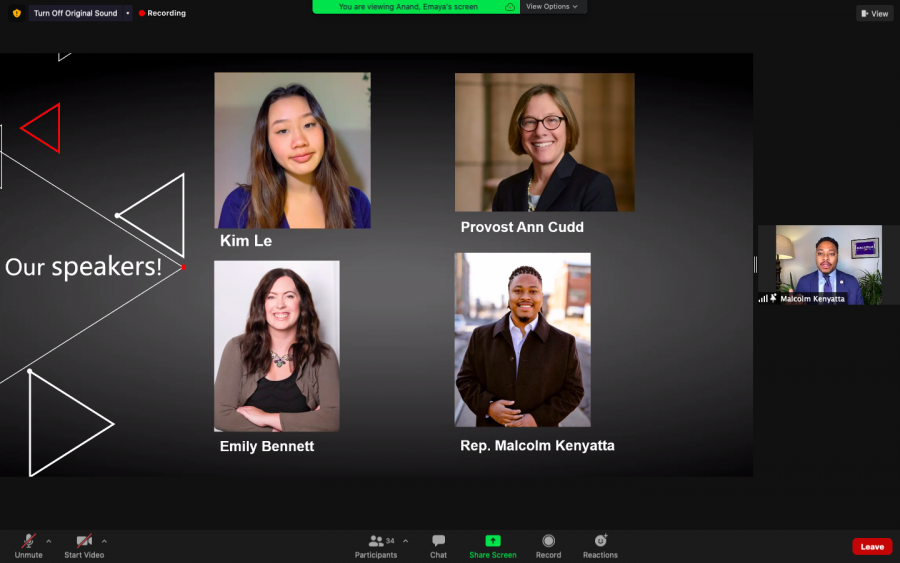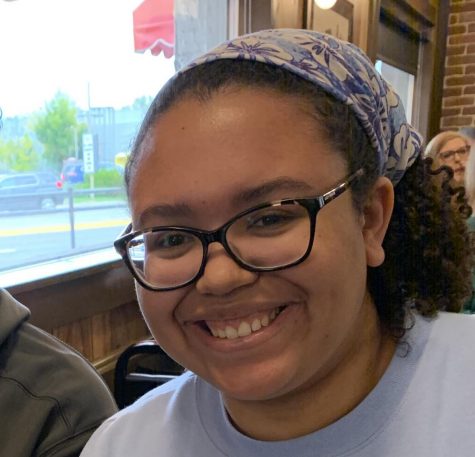TEDx @Pitt hosts conference to reflect on 2020
The club TEDx @Pitt hosted a conference Sunday afternoon featuring presentations from four speakers, including first-year microbiology major Kim Le, career consultant and Pitt alumna Emily Bennett, Rep. Malcolm Kenyatta of the 181st District of Pennsylvania and Provost Ann Cudd.
April 19, 2021
Kim Le, a first-year microbiology major, enjoys public speaking, but she was still a little nervous about giving a presentation at this year’s conference hosted by TEDx @Pitt. There, she discussed mental health and the struggles of adapting to living and working in a pandemic.
The club TEDx @Pitt hosted a conference Sunday afternoon featuring presentations from four speakers — Le, Pitt career consultant Emily Bennett, Provost Ann Cudd and state house Rep. Malcolm Kenyatta. All four talks reflected on how the COVID-19 pandemic has affected various aspects of life, and what we can take away from such a trying year.
After each presentation, which lasted 18-20 minutes, there was a brief Q&A session where students could ask the speakers about their topics and experiences. Students who were unable to attend the conference will be able to see the recordings online when they are uploaded to YouTube over the summer.
According to Emaya Anand, the president of the club, the long wait is due to having to get a TEDx license, but until then students can watch previous talks from Pitt on the channel.
“We have to get a license from TEDx, officially stating that this is a TEDx-licensed conference, that we can upload and we can record these videos and upload to the YouTube channel,” Anand, a first-year neuroscience major, said. “We don’t get that license until July, meaning that the videos won’t go up until July.”
TEDx @Pitt is a student-run organization who hosts conferences every year with topics that directly relate to the experiences of Pitt students. The term “TEDx” stands for an independently organized conference associated with the larger TED organization, a nonprofit devoted to sharing ideas about technology, engineering and design.
Since TEDx @Pitt is an independent conference, it was put together entirely by Pitt students, according to Ryan Young, vice president of the organization.
“TEDx is an independently organized TED conference,” Young, a first-year majoring in physics and astronomy, said. “We apply for a license to tend to host a conference without any sort of oversight, and then we just follow their guidelines, the spirit of TED, and they let us use their name and kind of use some of their marketing material.”
This year the executive board of the club was entirely made up of first-years and sophomores, including Anand. She said the club chose this year’s theme, “2020: A Year In Review,” because members wanted something relevant to Pitt students.
“The point of these talks is that people will want to take a lesson away from something, and so we thought, what kind of lesson or what kind of message would people want to hear right now,” Anand said. “That’s why we centered around that sort of 2020 reflection theme.”
Along with Pitt students, faculty and alumni, previous speakers for TEDx @Pitt include Lt. Gov. John Fetterman, Natalie Glance senior vice president of engineering at Duolingo, and Philadelphia Orchestra cellist Robert Cafaro. Previous conferences had themes such as “Internal Ignition,” “Rethink” and “Move.”
According to Anand, part of the goal was to give a reflection on 2020 from different perspectives, some directly relevant to students, and some students may not have considered.
“We wanted to get different types of perspectives on what 2020 was, whether that was a school perspective, a career perspective, a government perspective,” Anand said. “Things that you don’t realize 2020 has made you think about are what these speakers are going to be talking about.”
Le was the first speaker of the afternoon, and she gave a talk about her personal experience having half her senior year of high school and first year of college be entirely virtual. She also talked about the mental health struggles and realizations that came with that.
“I am very interested in mental health advocacy and wellness, both on a cultural and systemic level,” Le said. “It’s so easy, especially without spring break, or things like that, to get caught up in work and to get so stressed out. So I really just wanted to focus on personal wellness through this work culture and resilience and overcoming things in the past year.”
Le also addressed how, although it’s convenient, doing everything online can make the pressure to always be getting something done greater.
“Since it’s so easy to access anyone online, it’s so easy to feel like you have constant things and constant demand. So I think really just balancing like transitioning to college and like friends, and between classes and extracurriculars, that’s something I’ve really had to work on,” Le said.
Bennett, a Pitt alumna, spoke second, giving a presentation titled “Career Advice For When Life Isn’t Fair.” Bennet spoke about the various ups and downs of her career journey, including her experience as a college student in New York City during 9/11. She offered advice for students who need to adapt to a changing work environment.
Cudd spoke about the challenges leadership both at Pitt and within broader academia faced in trying to get classes to run smoothly during the pandemic. Cudd highlighted the need for grace in trying times, such as not judging people for more casual attire when they are attending class or meetings from home.
Presenting a governmental perspective on 2020, Kenyatta, of the 181st District of Pennsylvania and a candidate for the Senate, talked about how, for many people, the pre-pandemic “normal” was not working, and the importance of creating a new normal going forward that actually accommodates everyone.
Anand said the information presented at this conference is important because it is interesting information that also applies to students’ everyday lives.
“The cool thing about these kinds of conferences is that you’re always going to be learning something new, but the question, ‘Is it applicable to me? Do I care if I learned something new? Or do I care about what I’m learning?’” Anand said. “I think it’s important for kids to know that this stuff is actually more important than they think it is.”




